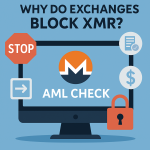Understanding Crypto Monitoring: Who Watches the Blockchain?
The world of cryptocurrency is built on decentralization, privacy, and transparency. While many believe that crypto transactions are anonymous, in reality, they are highly traceable. Various organizations actively monitor blockchain activity, ensuring security, compliance, and fraud prevention. Whether you’re a newcomer to the crypto space or an experienced trader, understanding crypto monitoring is essential.
What is Crypto Monitoring?
Crypto monitoring refers to the practice of tracking blockchain transactions in real time. Unlike traditional banking systems, where financial activity is only visible to account holders and regulatory bodies, blockchain transactions are recorded on a public ledger. This transparency allows different organizations to monitor activities for various reasons, such as compliance, security, and criminal investigations.
Who Monitors Blockchain Transactions?
Several entities actively monitor blockchain transactions:
- Government Agencies & Regulators
- Organizations like the Financial Crimes Enforcement Network (FinCEN), the SEC, and the FATF track suspicious crypto activities.
- Compliance with Anti-Money Laundering (AML) and Know Your Customer (KYC) regulations is enforced by authorities.
- Blockchain Analytics Companies
- Companies such as Chainalysis, CipherTrace, and Elliptic specialize in blockchain forensics.
- They analyze transactions to detect fraudulent activities, illicit fund transfers, and money laundering.
- Crypto Exchanges & Financial Institutions
- Centralized exchanges implement strict monitoring to ensure regulatory compliance.
- They track transactions to prevent illegal activities and enhance user protection.
- Cybersecurity Firms & Law Enforcement
- Cybersecurity companies monitor the dark web for illicit transactions and stolen funds.
- Law enforcement agencies collaborate with blockchain analytics firms to trace criminal activities.
Why is Crypto Monitoring Important?
While some view monitoring as an invasion of privacy, it plays a crucial role in securing the crypto ecosystem. Crypto monitoring helps in:
- Preventing Fraud & Scams – Identifying suspicious patterns and flagging fraudulent activities.
- Combating Money Laundering – Ensuring that cryptocurrencies are not used for illicit purposes.
- Enhancing Security – Protecting users from hacks, thefts, and unauthorized transactions.
- Maintaining Compliance – Helping exchanges and businesses adhere to global regulations.
Can You Stay Anonymous in Crypto?
Many newcomers believe that cryptocurrencies like Bitcoin offer complete anonymity. However, due to blockchain transparency, every transaction is publicly recorded. While privacy-focused coins like Monero (XMR) and Zcash (ZEC) provide additional anonymity features, they are still subject to monitoring efforts.
Users seeking greater privacy must utilize decentralized exchanges (DEXs), peer-to-peer trading, and privacy-enhancing tools like coin mixers. However, it is essential to balance privacy with compliance to avoid legal complications.
The Future of Crypto Monitoring
As the cryptocurrency market continues to evolve, so will monitoring technologies. Regulatory frameworks are tightening, and advanced AI-powered blockchain analysis tools are becoming more sophisticated. Understanding how crypto monitoring works will help traders, investors, and businesses navigate the digital economy safely.
To stay informed about the latest crypto trends, monitoring tools, and regulatory updates, visit CryptoMonitor.info daily!















